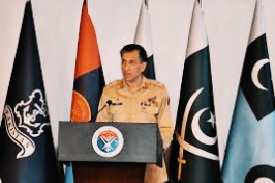Rawalpindi: Pakistan Army spokesperson Lieutenant General Ahmed Sharif Chaudhry has sounded the alarm about a possible false flag operation by India through the sea, saying that the country’s security forces are fully alert to any move by New Delhi.
In an in-depth conversation with journalists, the DG ISPR rejected claims that Pakistan allowed the US to use its territory for drone strikes on Afghanistan. He clarified that these baseless stories are part of Afghan propaganda.
Sharing crucial evidence, the spokesperson revealed that Afghan military personnel were directly involved in cross-border terrorism. During the last three months, several infiltration attempts were foiled and several militants were killed – 60% of them Afghan civilians, including some Afghan army personnel.
Highlighting internal security operations, Lt Gen Sharif said that 6,200 intelligence-based operations were conducted across the country, in which 1,667 foreign terrorists were eliminated, of which 128 were Afghans.
He added that the facilitators of the terrorists have been given three clear options: surrender, flee or face action. Militants are now moving from border areas to populated areas to exploit civilians as human shields.
The DG ISPR stressed that terrorism in Khyber Pakhtunkhwa is closely linked to drug trafficking, with poppy fields funding militant networks. “About 12,000 acres of poppy were cultivated, generating an income of up to Rs3.2 million per acre,” he said, adding that local figures and politicians were also involved.
He said that the Afghan Taliban protect this illegal trade because it benefits their drug network, while Pakistani forces and the ANF have destroyed large poppy fields in the Tirah Valley.
In response to a question about Khyber Pakhtunkhwa Chief Minister Sohail Afridi, Lt. Gen. Sharif remarked that he is an elected representative of the province and I cannot make personal allegations.
He rejected allegations that Pakistan was launching US drone operations, stressing that Islamabad had not signed any such agreement.
Finally, he reiterated that the failure of the Doha Agreement to establish an inclusive Afghan government was the root cause of regional instability.









